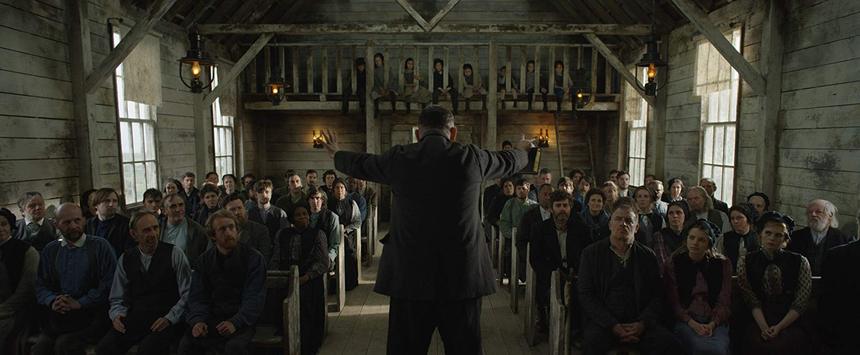Fantastic Fest 2018 Review: APOSTLE, Ambitious Folk Horror That Lacks Focus But Mostly Delivers Anyway
Dan Stevens and Michael Sheen star in Gareth Huw Evans' brutal folk horror.

There is a lot to like in Gareth Huw Evans' ambitious folk horror tale, Apostle. The problem might be that there is just too much of everything to really fall in love. The film takes huge swings at slightly incongruous tones and while it works to create a sense of unease throughout the running time, it does leave this viewer wondering exactly what kind of film this is meant to be. That lack of focus, an element that Evans managed so perfectly in The Raid: Redemption, often gives the audience a bit too much to chew on, however, the payoffs are big, and the choices are bold in this brutal tale of rescue, revenge, and redemption.
Upon arriving at his family's home following a long, unexplained absence, Thomas Richardson (Dan Stevens) learns that his sister has been kidnapped and is being held for ransom on a remote island controlled by a mysterious religious sect. He makes the trek to the island and, under the guise of a true believer, begins the dangerous journey that will hopefully lead to bringing her home. That road, though, is long and fraught with dangers he couldn't have imagined as this cult is led by a commanding and charismatic prophet named Malcolm (Michael Sheen), who'll stop at nothing to keep his island pure and prosperous.
Apostle is a beautiful film, the camera loves the sweeping countryside on which this religious cult has set up their homestead. Green stretches to the sea in every direction and cinematographer Matt Flannery's camera drinks it all in. Flannery has been the cinematographer on each of Evans' features so far, so it's very interesting to see how he moves from handling fast paced action to this more deliberate setting. However, Flannery and Evans don't completely abandon the form, and there are a few brief action flourishes that remind us just whose hands we are in, and those are a lot of fun.
Dan Stevens and Michael Sheen play very well against one another. While we've seen Stevens more than once adopting the role of hero, or at the very least heavy, I haven't seen Sheen in such a sinister role since the Underworld series, though this is very different. Both play characters with singular visions at direct conflict. Each man's only true focus lay in thwarting the other in attaining his goal, and each has his own devils to tame in attaining that goal. It may be one of my issues with the film, in fact, each character seems to be so brutally and deeply flawed and scarred - both inside and out - that it just all seems like too much.
Every half hour or so, Apostle seems to make the deliberate choice to shake the viewer out of any kind of comfort they may have found in their expectations. It begins as a revenge thriller, a man sets out to rescue his sister, and goes through a number of other genre, tonal, and thematic iterations before finally ending up in a very different place. I admire a filmmaker and a film that can keep the viewer on his toes, but with this film what could be masterful misdirection occasionally feels more like a schizophrenic sense of identity. It ends up in a good place, but I do sort of wish the route had been more direct.
No tiger can ever completely change its stripes, however, and even though this is as far from the martial arts films on which Evans made his bones, Apostle does show flashes of his trademarked brutal violence. The major difference here is that while there are a few scenes that teeter perhaps a bit too close to modern martial arts for a film set in the early 20th century, much of the brutality is more of the horror variety, and a few moments are particularly cringeworthy, especially one involving a medieval torture device I'd not want to find myself on the business end of.
One element on which the film relies rather heavily, and with good reason, is the unrelentingly tense score by Aria Prayogi. The film punctuates its many - many - moments of unease with atonal strings and slowly decaying melodies that create a sense in the viewer that something big is about to happen. Spoiler alert: more often than not, it does. Perhaps even too often. This is no fault of the composer, but Prayogi's score often goes back to the we're-going-to-make-this-unbearably-loud-and-then-instantly-silent trick enough times that it ends up meaning less as the film goes on, but thankfully it never quite loses its ability to put the viewer on edge.
The final thirty minutes of Apostle takes place a world apart from the film's opening acts, introducing horrific elements that were only vaguely hinted at during the prior one hundred minutes. Saying too much would definitely take away a bit of the surprise element, but suffice it to say that where the movie lands in the final reel is quite satisfying in that it does deliver on its initial promise, though not in a way I was expecting. There is probably about a half hour too much of the Apostle and its desire to be all things, Evans' seems insistent on putting all of his influences up on the screen and from time to time it lost me in the attempt. However, that brutal final act delivers in ways I didn't know I needed, including several moments of violent catharsis and comeuppance that will have you cheering in your seat.







